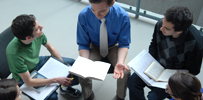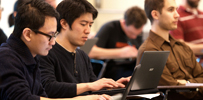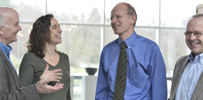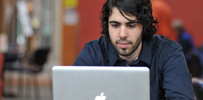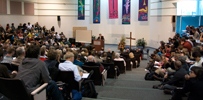Ashley Moyse Shares About Upcoming Science and Theology Initiatives

Dr. Ashley Moyse is Regent’s Post-Doctoral Fellow in Theology and Science. Ashley joins Regent College as part of a three-year initiative to advance conversations about the relationship of theology and science at the college and beyond, made possible by a generous grant from the John Templeton Foundation. In this interview Ashley discusses the upcoming science and theology events and projects at Regent, the “coinherence” of science and theology, why theology is not an “ivory tower,” and the experiences that turned him toward this field of study in the first place.
For your work with the Templeton grant, will you be working with Ross Hastings a lot or doing your own independent work?
Both. Ross has just finished a book, which will probably be published later this year, and that was his own thing. In many ways he’s introducing the concept of coinherence or the idea of coinherence as another way of exploring that relationship between science and theology in that volume. And there’s lots of correspondence there between his work and mine, because he is carefully Trinitarian; he’s focused on ontology. So the metaphysical components of his work correspond to mine. I’m charged as part of the grant to do my own monograph or book project. I’m likely to do a piece exploring technology—technology and human flourishing, located again with a particular problem or moral crisis that we face. That project will take most of my attention this year. It’s going to be a small book project of about 40,000 words.
There are some ways this Templeton Grant project will be happening on the ground. There’s a website and there’re public events. Can you talk about that?
Sure. That’s also where Ross and I will collaborate. The web portal—I think the grant calls it that—is a space in where we’ll cultivate articles and various media content that explores the relationship between science and theology. It will be all things science and theology. The construction of that is still in the works—how that’s going to be displayed and the type of information that’ll be disseminated there—but I do want that portal to be far-reaching and I would like a number of voices involved, not just those would ascribe to a coinherent model.
There’s a number of ways in which people conceptualize the relationship between science and theology: military metaphors in which they’re constantly battling; they’re complementary but they never crossover; they’re on train rails. I want those people involved. And I want those people who are arguing that theology ought not to be part of the conversation at all. I would like the site to be a pretty rich, content full resource for the public that’s intellectually stimulating for even the most serious of scholars, but readable for a broad audience. That’s what I’m aiming for. I’m pretty excited about it. We’ll probably unpack the site later this year, maybe at the end of the summer. I’m going to spend the first half of the year collating some materials and inviting people to participate.
Are there some events that are already in the books?
Next fall, 2018, there will be a symposium. It’ll function similarly to the Laing Lectures—a short series to which we’ll invite a leading scholar or leading scholars to campus to discuss something about science and theology. So we’re discussing right now who we might want to bring on. Ross and I are in agreement about who we might like to see. I won’t reveal any names quite yet. But that is sort of the main event.
There are also summer school lectures: both Ross and I will end up doing some evening lectures here. We would like to draw on some local resources. There’re a number of scholars in the area who do work in this field, particularly some UBC faculty in various disciplines—and also at Trinity Western University and UFV—there’s people in the area who are carefully exploring the correspondence and/or coinherence of science and theology. People in geography and geology and genetics. There is a rich resource of scientists who are thinking theologically about their work, which is exciting.
Let’s rewind a bit: how did your interests in science and theology start to merge?
During my first master’s degree—even during my undergrad—I studied in the area of applied physiology. Work in Colorado for my master’s degree in the sciences focused in what they called cancer symptoms management, or cancer rehabilitation. As part of my training and research, I spent a lot of time working with cancer patients one-on-one. But what I found interesting is that these people asked very few questions about human physiology—as they were quite confident they could use google, inquire with their oncologist, or look up answers in various books. Instead they asked numerous questions about death and dying, meaning and suffering, and many other ethical decisions—should I, should I not pursue treatment, etc.
I was 23, 24 at the time, and I often thought: “I don’t know how to respond to those questions.” I felt fairly ill-equipped to actually engage them meaningfully. But what was interesting is that as I continued to engage with these people and learned from these people, their questions compelled me to look elsewhere, away from the sciences. The questions I was curious about as an applied scientist were not the questions that these people were curious about—but their questions eventually became my questions, and I felt I had to pursue further study.
You’ve written on the relationship between Barth and bioethics. How do those two things actually combine?
I did that both for my theological master’s and my doctoral work. With my master’s degree, Ross Hastings was actually the external examiner. That project used some concepts of trinitarian theology to reimagine the way in which different methods of moral discourse might coalesce or coinhere. I even used the language of coinherence back then. … My doctoral work springboarded from that project and I proposed something quite similar, but in the first year of doctoral study it completely changed. The project I ended up doing continued to draw on Barth as a resource but saw ethics less propositionally and more associated with this formation of persons, so more akin to the way virtues might function, although I didn’t necessarily use the language of virtues. But I talked about the postures of human flourishing. Ethics is this process of struggling together in order to become human in the community of decision-makers that are located at a particular crisis and of course in bioethics there are many crises that exist.
Your doctoral work seems to have some deeply practical implications in regard to the way a doctor speaks to a patient.
In some sense. … I argue that bioethics—the way it functions now—at least in part, is a dehumanizing discourse and theology provides a means for us to re-humanize that discourse because it takes the other quite seriously. It’s concerned for the well-being of the other and Barth’s anthropology sort of grounds that work. Barth’s anthropology is relational. It grounds ethics ontologically in our very being, which is grounded ultimately in the being of Christ who we find is the primal other—the principal fellow who encounters us. In that encounter, we’re transformed. There is something quite interesting going on there about the type of ethics that emerges.
What are some of the ways you’re hoping to be involved in the community aspects of Regent for your two years here?
I don’t know. I’m pretty open. Part of it is learning what opportunities there are. I don’t necessarily know all the opportunities. I’m teaching a course with Ross on Wednesday nights every winter term, so I’m looking forward to that to engage with students in a meaningful way. I know there is the Soup Groups or something like that—is that what it’s called? I’d like to get involved in that because it seems like it’s much more relational…
There might be a social issues soup group; there is an arts soup group; there are all kinds of different things. There could very well be a science and theology one. I don’t know; you could start one.
Right. I’d like to be involved in that.
One of the questions during the interview process—I was interviewed two or three times—but the same question came up several times, about how this project was going to correspond with the arts here at Regent. The arts are pretty important here. I think the question was how do I see science and theology and the arts coalescing. My argument was that, at least in some respects, questions of aesthetics are common to all three. We’re all concerned with the body, at least I am concerned with the body, so somehow exploring how those people doing theology and the arts can also be involved in this project and how I also can be involved in their projects… I think that’s pretty important, and exciting to me.
Your interests could become even more diverse than they already are, expanding into the aesthetic realm.
Yeah, I think diversity is important. I do. I don’t want to be just a narrow specialist. I’d rather be a broad generalist.
And you’ve been married for a few years?
Yeah, for 10 years! For ten years this past April. We don’t have any children, but we are hoping to adopt. We’ve been waiting on that for a year. Who knows when that will come through.
What are some things you’re interested in when you’re not thinking about high-end theological or scientific concepts?
I like the outdoors. So hiking. And I used to climb a lot but not so much anymore.
Good place for it.
It’s a great place for it. But getting out in the water and paddling or hiking or cycling or whatever—I think about that a lot. I enjoy nature and I think about what’s the next little adventure my wife and our dog can go on.
I enjoy what I do. I enjoy work. And I work a lot. I enjoy my spare time reading theology and philosophy. I enjoy conversations over coffee or a glass of scotch. To me these people are really considering life and in the process of reading and thinking you’re engaged necessarily in life. People often think that what we do in the academy is this ivory tower thing—that we’re secluded from real life. Well, no: this is real life. We’re deeply concerned about real life. At least I am. I think the stuff that we’re doing needs to be connected to actual life. My work in ethics and politics, it moves somewhere. It comes from somewhere, and then it moves back to that same place. To constantly think about it is important and it’s a joy. I find this work to be joyful. It doesn’t make me happy necessarily. But joyful.
